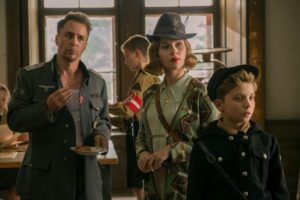JoJo Rabbit
Posted on October 24, 2019 at 5:46 pm
B +| Lowest Recommended Age: | Mature High Schooler |
| MPAA Rating: | Rated PG-13 for mature thematic content, some disturbing images, violence, and language |
| Profanity: | Strong and offensive language including anti-Semitic insults |
| Alcohol/ Drugs: | Alcohol |
| Violence/ Scariness: | Intense and disturbing peril and violence including a child injured in an explosion, wartime violence, bombs. guns, tragic deaths |
| Diversity Issues: | A theme of the movie |
| Date Released to Theaters: | October 25, 2019 |
| Date Released to DVD: | February 17, 2020 |

The first thing you need to know is that writer/director Taika Waititi does not play HItler in “JoJo Rabbit,” and it does not portray the real Adolf Hitler as a comic figure. Waititi plays a child’s imaginary version of Hitler. He has more in common with Chris O’Dowd’s imaginary friend character in his very funny and endearing Moone Boy. In both, the adult male figure is a child’s idea of what a man is, or what he would like to be when he grows up. In the case of Jojo Rabbit, the nickname for the 10-year-old Austrian boy at the center of the film, he is especially in need of a role model because of the uncertainty in his own life and the upheavals that are all around him. So it makes sense that he would respond by clinging to something that seems strong and structured and certain. And that is why when we first see him, he is looking in the mirror to admire himself in his Hitler Youth uniform, very excited to learn all about becoming an active member of the Nazi party. His imaginary friend represents what he would like to be, but JoJo is a child, so to us, his version of Hitler is ten-year-old’s fantasy. Which means he is very silly.
I tell you all this because for the first half hour or so of “JoJo Rabbit” you might think you’re watching some sort of “Springtime for Hitler,” from “The Producers.” But it turns out that while “JoJo Rabbit” does portray the Nazis in a heightened, satiric, silly manner, this is not an insensitive or superficial film. But by the end, it wants to pack a wallop, as it should, and it does.
JoJo (Roman Griffin Davis, in a knockout of a performance) lives with his mother, Rosie (a career-best Scarlett Johansson, warm and witty). His father is off in the war but has not been heard from for a long while. JoJo and his best friend Yorki (Archie Yates) go off to Hitler Youth camp, led by Captain Klenzendorf (Sam Rockwell), assisted by Fraulein Rahm (Rebel Wilson). The other boys laugh at him when he cannot bring himself to kill a rabbit (prompting his derisive nickname), and so to prove his courage, urged on by the imaginary Hitler, he takes a risk that leads to his being injured in an explosion, leaving scars on his face. He cannot return to school, so Rosie takes him to the Hitler Youth office and insists that Klenzdorf give him a job.
And then something happens that turns JoJo’s ideas about strength, courage, and power upside down. His ideas about Jews, too, though that takes a while. Waititi handles the tonal shift with great skill, and by the end of the film, the heightened tone blends seamlessly with the surreal absurdity of war, making the conclusion as meaningful to us as it is to the characters.
Parents should know that this movie is set in the last months of WWII and has wartime violence including guns and bombs, portrayal of virulent and systemic anti-Semitism. A child is injured in an explosion and a parent is murdered. Characters use strong language, drink alcohol, and smoke.
Family discussion: Why did JoJo imagine Hitler as an imaginary friend? What made him change his mind about Elsa? Why didn’t Elsa tell him what she knew about the letters?
If you like this, try: Hunt for the Wilderpeople and What We Do in the Shadows from the same writer/director. You may also enjoy satiric takes on war like “Oh, What a Lovely War,” “M*A*S*H,” and “King of Hearts.”
